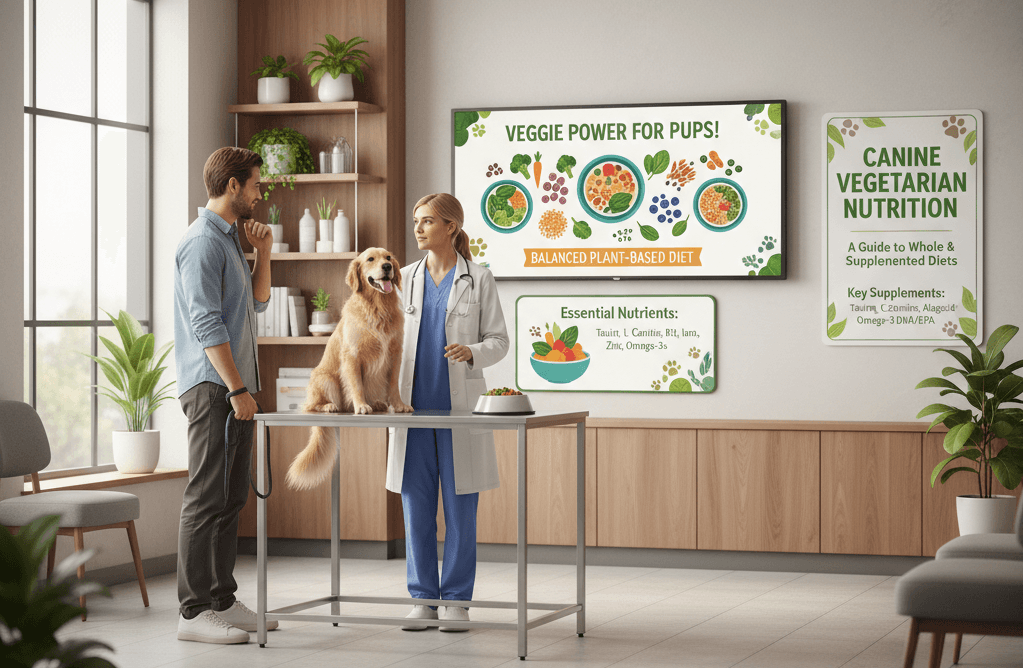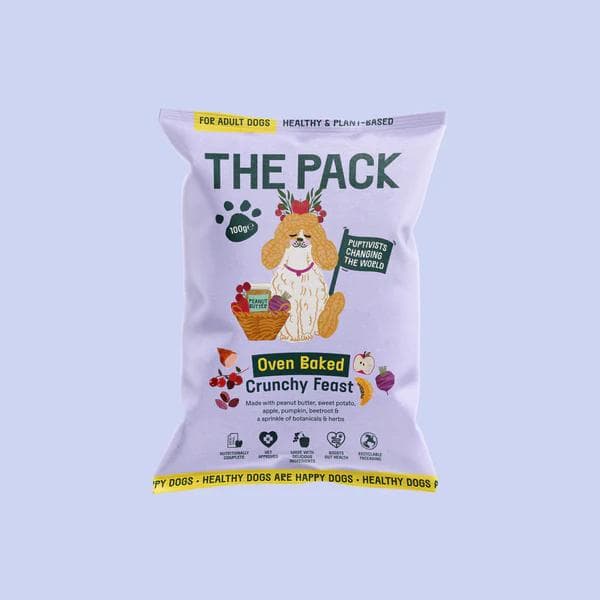Key Takeaways
- Vegetarian diets have nutritional gaps that need to be filled in with the right supplements. For example, taurine, L-carnitine, and vitamin B12 are important for a dog's heart, muscles, and nervous system health, but they are hard to find in plant-based diets.
- Plant-based diets raise the risk of not getting enough protein: Proteins from plants are less bioavailable and often incomplete, therefore they need to be carefully mixed to make sure they have the right amino acid profiles for dogs' dietary needs.
- Urinary health problems can happen when pH levels change: Vegetarian diets can change the pH of urine, which can lead to crystal formation or infections if the right ingredients aren't chosen and checked regularly.
- Health risks rise without veterinary supervision: If a vegetarian diet isn't followed correctly, it can cause serious problems like heart disease, malnutrition, and digestive difficulties. This shows how important it is to have regular professional care. The British Veterinary Association stresses that while interest is growing, the evidence on vegan and plant-based dog diets remains limited, and long-term safety has not been confirmed.
- Proper supplementing is a must: Vegetarian diets can't keep dogs healthy in the long run without fortified foods or vitamins, therefore they aren't good enough on their own for most dogs.
- Underlying health disorders can make hazards worse: Dogs with kidney illness, allergies, or other medical issues may not do well on vegetarian diets and typically need very specific nutrition plans.
- Research on long-term impact remains limited: While changing research suggest plant-based meals can be practical, their long-term safety and efficacy in sustaining optimal canine health are yet to be fully validated.
Feeding dogs a vegetarian diet takes more than just moral concerns. It also needs careful planning, constant monitoring, and regular supplements to fill up nutrient shortfalls and keep them healthy overall.
Introduction
Changing a dog's diet to vegetarian may seem like a natural extension of your own morals and aspirations for the environment, but it can be very hard for them to receive the nutrients they need because of how their bodies work. Dogs are facultative carnivores, which means they have traits that make animal-based proteins and lipids more appealing to them. This makes it hard to balance plant-based diets. Without careful planning and professional supervision, these kinds of diets can cause deficiencies, metabolic difficulties, and major health problems.
Pet owners are becoming more interested in vegetarian meals for their dogs, but these diets require careful planning and execution to be healthy for dogs in the long run. Changing the nutritional building blocks for dogs is a big deal since it can affect their amino acid intake and put them at risk for things like urinary pH changes and taurine deficits.
This article goes into detail about the problems, important nutritional factors, and safe ways to put dogs on vegetarian diets. You can make smart choices that put your dog's health and happiness first by looking at the facts and possible risks.
Learning about what dogs need to eat
It's not as easy as just switching out meat for plants when it comes to dog nutrition. Dogs developed as facultative carnivores, which means they do best on diets that are mostly made up of animal-based proteins and lipids but can also digest some plant material. This evolutionary design is what they need to stay healthy.
The Association of American Feed Control Officials (AAFCO) has made nutrient profiles that help commercial dog meals. For adult dogs, the minimum protein level is 18%, and for puppies, it is 22.5% on a dry matter basis. These percentages, on the other hand, just give a small taste of what dogs need. For example, they need 22 amino acids in total, 10 of which are essential and must come from food. Animal proteins have all the amino acids that dogs need in forms that are easy for them to digest and absorb. Plant proteins, on the other hand, don't always have all the amino acids they need.
For instance, chicken meal has a protein digestibility rate of more than 85%, which makes it a good supply of important amino acids like methionine, lysine, and leucine, which are all important for keeping and repairing muscles. Plant-based alternatives are hard to get to these high levels of bioavailability because they are hard to structure and have anti-nutritional components like phytates.
Studies show even more how good animal proteins are. Dr. Sarah Johnson's research at Colorado State University discovered that dogs consuming meals abundant in high-quality animal proteins exhibited superior muscle composition and energy levels relative to those dependent on incomplete protein sources over a one-year trial. These results show once again how important protein quality is for keeping dogs healthy.
Dogs need more than just protein; they also need the right amounts of micronutrients like omega-3 and omega-6 fatty acids, as well as important vitamins like B12, which are found in animal products. Knowing these basic demands is important for understanding the problems that vegetarian dog diets might cause.
Problems with Feeding Dogs a Vegetarian Diet
Bioavailability and Digestive Issues
One of the biggest problems with plant-based diets for dogs is that plant proteins are harder to digest and absorb. Animal proteins are usually very easy to digest, with rates of up to 95%. Plant proteins, on the other hand, are much harder to digest, with rates of just 45% to 75%. This gap can lead to reduced plasma amino acid levels, even when the amount of protein in the diet is enough to meet theoretical needs.
A revolutionary study by Dr. Michael Chen, published in the Journal of Animal Nutrition, found that dogs that only ate plant-based proteins saw plasma amino acid levels drop by 31% in six weeks. This lack of nutrients shows how plant-based diets can leave dogs malnourished if they don't get enough supplements or protein.
A recent nutritional analysis of meat-based vs plant-based dry dog foods in the UK (PLOS One, 2025) found that many plant-based options were low in key nutrients such as iodine and certain B-vitamins, raising concerns about whether they truly meet dogs’ long-term needs.
Also, plant-based foods can have anti-nutritional compounds like phytates and oxalates that make it harder for the body to absorb important minerals like calcium, zinc, and iron. For instance, dogs that eat a lot of soy have been found to be low in zinc, which can cause signs like hair loss and a compromised immune system within just two months of changing their diet.
Limitations of Metabolism
The digestive system of dogs doesn't have the right enzymes to break down plant-based foods, especially fibrous ones. Dogs don't make as much cellulase and other enzymes that help break down plant cell walls as herbivores do. This means that they can't get enough nutrients from plant-based foods.
A research at the University of California, Davis found that over 34% of dogs that switched to vegetarian meals had long-lasting digestive problems, with symptoms ranging from diarrhoea to not being able to absorb nutrients. These problems show how hard it is for the body to get enough nutrients from plant-based diets.
Nutritional Deficiencies in Plant-Based Diets
Taurine Deficiency
Taurine deficits are still one of the biggest problems with vegetarian dog diets. Taurine is important for the heart, the retina, and the generation of bile acids, but plant-based foods don't include much of it. Dogs could get diseases like dilated cardiomyopathy (DCM) if they don't get taurine directly. Dr. Lisa Freeman's research at Tufts University has found a correlation between plant-based and grain-free diets and more incidences of DCM, especially in breeds that are more likely to have cardiac problems.
L-Carnitine and the Way Energy Is Used
L-carnitine, which helps the body make energy by breaking down fatty acids, is also quite rare in plants. If dogs don't get enough of this nutrient, they may become lethargic, lose muscular mass, or even have decreased physical endurance unless they have accessible sources of L-carnitine.
Not Enough Vitamin B12
Vitamin B12 is another important nutrient that is mostly found in animal products. It is very important for DNA synthesis and brain health. Dogs that eat vegetarian diets are very likely to become deficient in B12, which can cause neurological problems including poor coordination or worse cognitive function over time.
As Purina UK explains, vitamin B12 is critical for DNA synthesis and nervous system function, and deficiencies can quickly lead to neurological problems in dogs.
Conclusion
It is very important to be precise and add to a dog's vegetarian diet. Dogs have evolved to get their nutrients from animal proteins, lipids, and micronutrients. This makes it hard to supply their needs with only plant-based foods. The risks of switching dogs to vegetarian diets without enough knowledge or veterinary supervision are shown by the deficiencies in taurine, L-carnitine, and vitamin B12, as well as the fact that plant proteins are not as easily absorbed by the body.
Although recent studies indicate possible feasibility in controlled settings, the long-term safety and usefulness of plant-based meals for dogs have yet to be shown. If you're thinking about changing your dog's diet, you need to focus on making sure that the food meets their specific needs, putting health and longevity above your own tastes. In the end, the greatest diet for your dog is one that keeps them healthy, happy, and full of energy for years to come.





